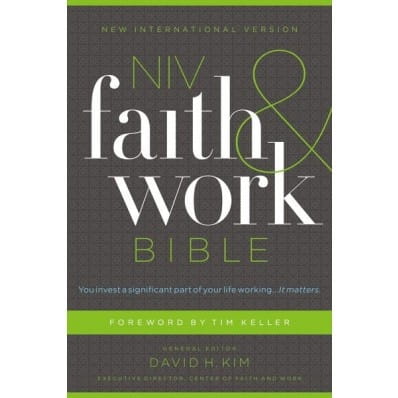How to Pray for Your Work

Prayer can significantly impact the work that we do and the way we see it. Yet in our day-to-day prayers, we often exclude the needs we encounter at work. For whatever reasons, our work and workplaces do not enter our minds as we pray. As a result, we may not experience the fullness of what God wants for us when we’re at work. When we start praying for our work, we recognize that God is active in all we do, not just our “personal” or “spiritual” lives. And this is transformative. Yet prayer doesn’t change God’s heart toward our work as much as it changes ours. And when we begin to see our work the way God sees it, we experience the power of prayer and of God’s grace.
Deeper in Truth
Prayer is a deep topic, one that takes a lifetime to explore. One particular aspect of prayer that is seen throughout the Bible is its power to bring change. The gospel gives the believer every reason to pray, be- cause in Christ God has made the impossible possible. The gospel is the power of God to heal a broken world, and this power is made available to those who look to God in faith. One of the prayers we see most often in the Bible— especially in Paul’s letters—is for God’s people to be em- powered. While we all are tempted from time to time to pursue power for the wrong reasons, the right kind of pow- er is still a good thing. New Testament scholar D. A. Carson helps clarify why Paul prayed for the Ephesian church to experience God’s power:
This . . . petition, then, is a plea for power—power to be holy, power to think, act, and talk in ways utterly pleasing to Christ, power to strengthen moral resolve, power to walk in transparent gratitude to God, power to be humble, power to be discerning, power to be obedient and trusting, power to grow in conformity to Jesus Christ . . . But God’s purpose for the men and women he redeems is not simply to have them believe certain truths but to transform them in a lifelong process that stretches toward heaven. And so Paul prays along just such lines: he asks his heavenly Father that out of his glorious riches he might strengthen believers with power through his Spirit in their inner being, so that Christ may dwell in their hearts through faith.1
Paul wanted people to see Christ more clearly, and he knew that God’s power would accomplish that. The gospel is the power to change people (see Ro 1:16), and when people see Christ more clearly, they are empowered to live and act as God intended.
We can apply Paul’s teaching in three ways. First, let us pray that God’s power may help us see the issues we encounter at work as opportunities for God to show his glory. Second, let us pray that God’s power conforms us to the image of Christ. Third, let us pray that God’s power enables us to extend his love to others. God’s transformative and creative power is upon us, and can significantly inform our work and the way we live our lives.
Connecting
For various reasons, it is easy to forget to pray about the ups and downs of our work. We may focus on praying for family and friends, or on our own personal growth or needs. But we neglect the issues that arise from or at work. Yet God wants to open our eyes to see how he is able to do more than we can ask or imagine (see Eph 3:20) in every sphere of life. His power changes not only the way we see, but also how we pray. He wants us to express our thanks to him for the work that we do, as well as petition him about every concern we have. And he wants us to realize that prayer can change even our circumstances at work.
EXECUTIVE AND LEADERSHIP COACH
In my early thirties, I was successful and happily married. I was also prideful. I saw no need for God
in my life. Then I was diagnosed with a heart murmur, and that led me to explore Christianity. After attending a church for two years, I finally bowed my proud heart and became a Christian.
Many months later, our cleaning lady inquired about a new book on my nightstand, my Bible. I had been praying for God to show me who had been praying for my husband and me. So I asked her, “Was it you? Were you praying for us?” She replied, “Yes, I pray for my clients every day.” There was a large socioeconomic gap between us, and I’m quite certain that if she’d spoken directly to me about God before my conversion, I would have been too proud to listen. But God used her prayers to bring me to Christ.
I am an executive coach, and there is usually a large socioeconomic gap between my clients and me. And in my work, prayer isn’t on the radar screen—and it’s not encouraged. I’ve learned, howev- er, that God’s truth is the truth, and that it applies everywhere. If I can’t speak directly to my clients about God, then I can speak directly to God about my clients.
When I first became a Christian, I thought prayer was about preparing me for the work, but I’ve discovered that prayer itself is the work. It’s the main event. It’s what brings Scripture from the head to the heart. Prayer is relationship—relationship with Someone who is all knowing, all wise and all magnificent. This knowledge leads me to pray at work: “Lord, is there a Scripture that’s particularly pertinent to this issue, to this person or to me?”
Once I was working with a client who was on the short list to become the next CEO of his company. While preparing his feedback report, I started to daydream: “If I do my job right and give him good feedback, this guy will be the next CEO, and I’ll be the power behind the throne.” It was disgusting.
I tried to write the report, but I had writer’s block for three days. This had never happened to me before. Finally, I took a break to listen to a sermon citing Jeremiah’s message to Baruch, the king’s servant: “Should you then seek great things for yourself? Do not seek them” (Jer 45:5). Immediate- ly, my heart was pierced. As I prayed, God convicted me: “Stop. You’re making this all about you and you’re seeking your own glory. Repent.”
I returned to the report and, with God’s favor, finished it in two hours. This is an example of what the living God can do with us if we let him test our motives and hear from him in prayer. He can change us and the way we work.
1. D. A. Carson, A Call to Spiritual Reformation: Priorities from Paul and His Prayers (Grand Rapids: Baker, 1992), 189–90

General Editor David H. Kim oversees all the ministries of the Center for Faith & Work as Executive Director and is the Pastor of Faith and Work at Redeemer Presbyterian Church in New York City. Prior to this role, David served as the Director of the Gotham Fellowship, developing and teaching its intensive curriculum while providing spiritual direction. Prior to joining CFW in 2007, David was a Chaplain at Princeton University, where he also served as the Founder and Executive Director of Manna Christian Fellowship for over 12 years.
For more information please visit www.faithandworkbible.com, and find out what job you would have had in Bible times by taking this quiz!
Publication date: November 10, 2016
Image courtesy: Thinkstockphotos.com
Originally published August 13, 2018.







